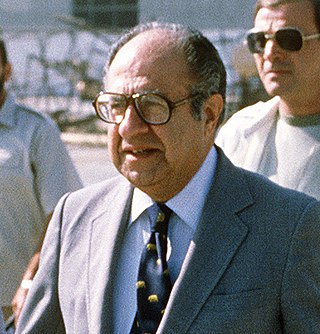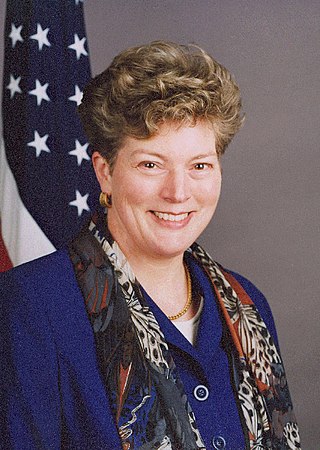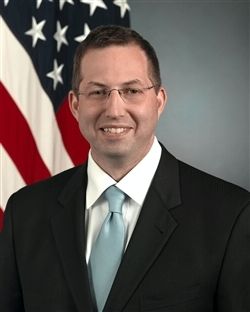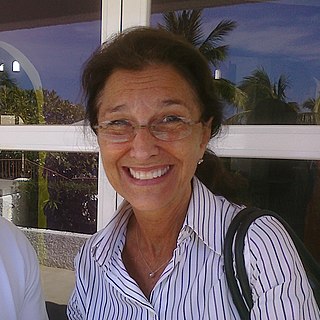
The Trilateral Commission is a nongovernmental international organization aimed at fostering closer cooperation between Japan, Western Europe and North America. It was founded in July 1973, principally by American banker and philanthropist David Rockefeller, an internationalist who sought to address the challenges posed by the growing economic and political interdependence between the U.S. and its allies in North America, Western Europe, and Japan. The leadership of the organization has since focused on returning to "our roots as a group of countries sharing common values and a commitment to the rule of law, open economies and societies, and democratic principles".

David Packard was an American electrical engineer and co-founder, with Bill Hewlett, of Hewlett-Packard (1939), serving as president (1947–64), CEO (1964–68), and chairman of the board of HP. He served as U.S. Deputy Secretary of Defense from 1969 to 1971 during the Nixon administration. Packard served as president of the Uniformed Services University of the Health Sciences (USU) from 1976 to 1981 and chairman of its board of regents from 1973 to 1982. He was a member of the Trilateral Commission. Packard was the recipient of the Presidential Medal of Freedom in 1988 and is noted for many technological innovations and philanthropic endeavors.

Harvard Kennedy School (HKS), officially the John F. Kennedy School of Government, is the school of public policy and government of Harvard University in Cambridge, Massachusetts. The school offers master's degrees in public policy, public administration, and international development, four doctoral degrees, and various executive education programs. It conducts research in subjects relating to politics, government, international affairs, and economics. As of 2021, HKS had an endowment of $1.7 billion. It is a member of the Association of Professional Schools of International Affairs (APSIA), a global consortium of schools that trains leaders in international affairs.

The White House Fellows program is a non-partisan fellowship established via Executive Order 11183 by President Lyndon B. Johnson in October 1964. The fellowship is one of USA's most prestigious programs for leadership and public service, offering exceptional US Citizens first-hand experience working at the highest levels of the federal government. The fellowship was founded based upon a suggestion from John W. Gardner, then the president of Carnegie Corporation and later the sixth secretary of health, education, and welfare.

Warren Minor Christopher was an American attorney, diplomat and statesman who served as the 63rd United States secretary of state from 1993 to 1997.

The Commonwealth Club World Affairs of California is a non-profit, non-partisan educational organization based in Northern California. Founded in 1903, it is the oldest and largest public affairs forum in the United States. Membership is open to everyone.
The Robert F. Wagner Graduate School of Public Service is the public policy school of New York University in New York City, New York. The school is named after New York City former mayor Robert F. Wagner Jr. in 1989.

Philip Charles Habib was an American career diplomat active from 1949 to 1987.

James Braidy Steinberg is an American academic administrator and former diplomat, who served as the United States deputy secretary of state during the Obama administration. He has been the dean of the Paul H. Nitze School of Advanced International Studies (SAIS) at Johns Hopkins University since November 1, 2021. Previously he was a professor at the Maxwell School of Citizenship and Public Affairs at Syracuse University.
Membership in the Council on Foreign Relations comes in two types: Individual and Corporate. Individual memberships are further subdivided into two types: Life Membership and Term Membership, the latter of which is for a single period of five years and is available to those between the ages of 30 and 36 at the time of their application. Only U.S. citizens and permanent residents who have applied for U.S. citizenship are eligible. A candidate for life membership must be nominated in writing by one Council member and seconded by a minimum of three others.

Kathleen Stephens was the United States ambassador to South Korea from 2008 to 2011. She also served as the United States' chargé d'affaires to India from March to December 2014. She currently leads the Korea Economic Institute of America as president and CEO.

Wendy Ruth Sherman is an American diplomat who served as the United States deputy secretary of state from April 2021 to July 2023. She was a professor of the practice of public leadership and director of the Center for Public Leadership at the Harvard Kennedy School, a senior counselor at Albright Stonebridge Group, and a senior fellow at the Belfer Center for Science and International Affairs.

Thomas Edward Donilon is an American lawyer, business executive, and former government official who served as the 22nd National Security Advisor in the Obama administration from 2010 to 2013. Donilon also worked in the Carter and Clinton administrations. He is now Chairman of the BlackRock Investment Institute, the firm's global think tank.
U.S. President Barack Obama's East Asia Strategy (2009–2017), also known as the Pivot to Asia, represented a significant shift in the foreign policy of the United States since the 2010s. It shifted the country's focus away from the Middle Eastern and European sphere and allowed it to invest heavily and build relationships in East Asian and Southeast Asian countries, especially countries which are in close proximity to the People's Republic of China (PRC) either economically, geographically or politically to counter its rise as a rival potential superpower.
The Sesquicentennial of Japanese Embassy to the United States in 2010 marked the 150th anniversary of the first Japanese diplomatic mission to the United States in 1860. The purpose of the 1860 Japanese diplomatic mission was to ratify the Treaty of Friendship, Commerce and Navigation, which had been signed several years earlier.

Derek James Mitchell is an American diplomat with extensive experience in Asia policy. He was appointed by President Barack Obama as the first special representative and policy coordinator for Burma with rank of ambassador, and was sworn in by Secretary of State Hillary Clinton on October 2, 2011. On June 29, 2012, the U.S. Senate confirmed him as the new United States Ambassador to Burma. On September 4, 2018, Mitchell succeeded Kenneth Wollack as president of the National Democratic Institute, a position he served until September 2023.

Jane Wales is an American non-profit executive and former US government official who has served on the boards of directors of and founded many institutions. She is a Vice President of the Aspen Institute, and was the CEO of the World Affairs Council of Northern California for 20 years before resigning in 2019. She was also the founder and CEO of the Global Philanthropy Forum, She helped found the African Philanthropy Forum and the Brazilian Philanthropy Forum, and was the initial Executive Director of the Elders. Moreover, she advises many philanthropists and is a member of the board of the Center for a New American Security. She serves as co-chair of the Generosity Commission. Her articles have appeared in The Guardian, the Stanford Social Science Review, Aspen Ideas Magazine and other publications. She is frequently interviewed on national security and economic development issues on television and public radio.

Joseph Yuosang Yun is an American diplomat. He is the former U.S. Special Presidential Envoy for Compact Negotiations, appointed in March 2022 by President Joe Biden to negotiate amendments to the Compact of Free Association (CFA), the agreement governing the relationship between the United States and the Freely Associated States (FAS) of the Federated States of Micronesia, the Republic of the Marshall Islands, and Palau.

The Foreign Affairs Policy Board is an advisory board that provides independent advice and opinion to the secretary of state, the deputy secretary of state, and the director of policy planning on matters concerning U.S. foreign policy. The board reviews and assesses global threats and opportunities, trends that implicate core national security interests, tools and capacities of the civilian foreign affairs agencies, and priorities and strategic frameworks for U.S. foreign policy. The board meets in a plenary session several times a year at the U.S. Department of State in the Harry S. Truman Building.














